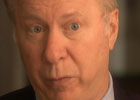Close observers and journalists offer their preliminary assessments on the dynamics of this team, drawing on some of the circumstantial evidence.
- Barton Gellman
- Ron Suskind
- David Gergen
- Martin Lederman
- Jane Mayer
- Bruce Fein
- Related Link
- "A Different Understanding With the President"
Part one of Washington Post reporter Barton Gellman's June 2007 four-part series on Dick Cheney's vice presidency.
Barton Gellman
The Washington Post
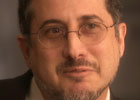
Dan Quayle went to see Dick Cheney, who he'd known for a long time, right around inauguration day in Bush's first term. He sort of went in, one vice president to another, to let him know how things were going to be. And he said, "You know, Dick, you're going to be doing a lot of traveling, going to a lot of funerals, lot of fundraisers. You're going to be doing the things that presidents don't want to do, and that your president doesn't want to do." And Cheney just looked at him with that little half-grin and raised his eyebrow and said, "I have a different understanding with the president." He didn't elaborate too much, and he doesn't tend to elaborate very often, but they talked a bit more about it. What Quayle told The Washington Post is that Cheney was going to be, in effect, a super-chief of staff.
Now, preceding that by several weeks, … Josh Bolten, who was the policy director then of the Bush transition, and Lewis Libby, Scooter Libby, who was Cheney's key guy, sat down to try to figure out, what's going to be the brief? What's going to be the portfolio for Vice President Cheney? They're looking back at Quayle who had the Competitiveness Council, and Gore who had "reinventing government" and they are looking for Cheney's niche. I think they brought him some ideas, and Bolton told us, a bit dryly, that Dick Cheney did not warm to those ideas.
What they discovered had already developed -- because Cheney talked about it with Bush -- was a role in which Dick Cheney would be welcome at every table, at every meeting, and he would be given a blank check not to make decisions for Bush, but to intercede at any level he chose to. He would choose his priorities.
Bush also gave him, by design, several important portfolios, especially at the beginning. When Bob Graham became chairman of the Senate Select Committee on Intelligence, he went in a normal sort of courtesy visit to see Bush in the Oval Office. And some time during that first -- and only -- meeting, Bush told him, "Dick Cheney's going to be your point of contact in the White House. He has the brief for intelligence." That's a fairly remarkable thing for a president to do.
What does it say?
I don't think that Bush consciously delegated decision-making authority to Dick Cheney or anyone else. What he delegated was detail, and … those details define what the policy really is. You could have a goal, you could have an end, but it's the means that define what government does and what it doesn't do. And Dick Cheney tended to get the lead on many of those implementing decisions.
Ron Suskind
Author, The One Percent Doctrine
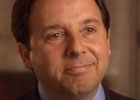
At the start there is a sense that Cheney will be the man of probity, the guy who respects process, due diligence. George Bush obviously is green in a lot of areas that sometimes presidents are, clearly he is. Cheney is the most experienced … [vice president] that we've had in modern times. And the view is Cheney will be there to respect the long traditions in history of executive branch function, of process. And that gives people comfort. …
What roles is he given early on?
… During the transition, you see Cheney essentially sort of mapping territory. Certain people like [former Treasury Secretary] Paul O'Neill or [former Secretary of State] Colin Powell are like, "What's he doing?" Cheney was essentially creating the architecture in which George Bush would live as president. … Cheney would provide the framing and cosseting of Bush in terms of what Bush would have available to him.
From the very beginning Bush is giving to Cheney more in terms of latitude and authority than any modern president has given to a vice president, certainly a president who's not incapacitated.
What's fascinating at the start is how they kind of learn to work together. Here you've got the most skilled and experienced vice president and inexperienced president, and they've got to kind of work out their dance. And somewhere around the spring, summer of 2001, they have a conversation in which Bush says to Cheney, "You know, I need you to stop talking so much in meetings where we're together." That's the essence of it. When they're together, as often a president and a vice president will be, Cheney is commanding too much authority in the crowded rooms with other cabinet-level people, some of them folks of great experience as well. Bush is seeing clearly and early that this is not going to work. …
After months of such meetings, Bush took Cheney aside during one of their encounters and said, "You need to kind of step back a little bit here. This is not working as it needs to work. You and I will talk a thousand times. But we need to do it in private. When everything's done, everything's settled, and I've got to make a decision, that's when we'll get together and you'll help me kind of figure out where we're going here." …
And these lunches with Cheney and Bush with the doors shut -- you know, historians are going to pull their hair out over this because almost entire strategies of the government were conducted in these little rooms with no transcripts, with no one there except the president and the vice president. That's how tight the circle becomes in the Dick Cheney White House that George Bush lives in.
[With the decision to try enemy combatants in military tribunals], here you've got this thing that Lincoln pulls his hair out over, Roosevelt frets over in terms of the spies. And it happens at lunch, Cheney and Bush. Cheney kind of lays it out and Bush says, "Sounds good to me." That's it. There wasn't a lot of deliberation. … Cheney pretty much framed it all for him and then at lunch he said, "Here are the options." Bush says, "Check Box A," and off we go.
What was the blowback?
Traditionally, enormous issues like this, suspension of rights like habeas corpus at a time of peril, that kind of thing would be fought at the level of the National Security Council principals, let's say. It would be fought in rooms with all of the key players there. … That doesn't happen here. It doesn't happen in the George Bush White House. …
David Gergen
Adviser to Presidents Nixon, Ford, Reagan and Clinton
I think it's too facile, and I see it too often, that a lot of the interpretation of what happens in administrations is that "Well, it must be this person as attorney general, or it must be that person as chief of staff. If a president just had a different person in there, the policies would be totally different." Sorry -- it's almost uniformly the chief. The president has the chief of staff he wants, and he has an attorney general doing things he wants him to do. It's the president who makes the calls on this, and the people around him reflect the president, what the president wants.
That's true even for this particular president and this particular vice president?
I think this particular vice president has had an enormous amount of persuasion with this president. I think he's listened to him more closely than anybody else, especially in those early years. But still at the end of the day it's the president who's made the calls, and I think this penchant for secrecy and large executive power that Dick Cheney has been pushing, I think it's something the president has bought into. Did Cheney help to persuade him? Absolutely. But is the president now persuaded? Absolutely. I think he's now a devotee of expanded executive power.
You ought to take a close look at a painting which George W. Bush bought when he was governor and had installed in his office as governor. He asked his staff to come and look at it because, he said, "That's us." What it is, is of a lone rider on a horse going up what looks like a mountaintop or crag or something like it, and his men are desperate to try to keep up with him, and they're behind. But he's running through the brush, and he's pell-mell ahead. And what you're a little uncertain of is, is this a leader who's going to lead us to the mountaintop, or is this a fellow who's going to take us over a cliff? You can't tell, because the painting is a little ambiguous in that regard.
Martin Lederman
Attorney adviser, Office of Legal Counsel, 1994-'02
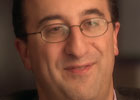
When the histories are written of the Bush administration, I think they will center around Dick Cheney and, on the domestic side, on Karl Rove. And the interesting question that I don't think anyone has figured out yet is not what makes Cheney tick, because that's been sort of evident for two decades now, but why in many, many cases, the president has deferred to Cheney's quite unorthodox and aggressive views, even when there are many people close to the president -- loyal, conservative Republicans, Condi Rice and Colin Powell and many others, and career people in the CIA and at the Defense Department, and others -- who are desperately urging the president to go in a different direction. Nevertheless, the president has decided that nine times out of 10, he's casting his lot with the vice president. I don't know why. I think the historian that figures that out will have hit the bull's-eye.
Jane Mayer
The New Yorker
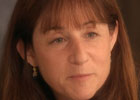
In other presidencies that I've covered, anyway, most of the center of the action is in the president's office; it's in the Oval Office, or maybe even the White House Counsel's office. But the strange thing about this administration is all of the most crucial decisions seem to be taking place in the vice president's office, or even the vice president's counsel's office.
So yeah, it's very strange, and it's not coincidental. When [vice presidential aide David] Addington first took office, he explained to an old friend that they were going to rearrange the lines of command inside the White House, and there weren't going to be two separate lines of command. It wasn't going to be a vice president's office and a president's office, they were going to have the whole thing kind of united, and the vice presidency was going to deal with all of the national security issues.
That's why he has such a big national security staff, and I suppose that's why Scooter Libby was a presidential adviser, as well as a vice presidential adviser, right?
Yeah. I mean, everything in the White House is about paper flow, too. And they had it so all the paper flow that came out of the NSC [National Security Council] went by the vice president's office so they could see every level of decision being made inside the NSC. And if they disagreed with something, they could, you know, snuff it out in the very beginning, which is what they did with a number of things.
Bruce Fein
Associate deputy attorney general, 1981-'83
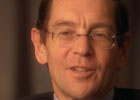
President George Bush has de facto enabled Vice President Cheney to make the decisions on the critical elements of national security, whether it's Iraq, whether it's enemy combatants in Al Qaeda, military commissions or otherwise. It's not like he's actually written a document, like he would have to do under the 25th Amendment if he was claiming mental incapacity, saying, "The vice president now is my surrogate."
But we know as a matter of mutual understanding, even if it's not written down, that the vital decisions are made in the Office of the Vice President. I knew someone who was a candidate for the Supreme Court. He told me he was interviewed four hours by Cheney's people and maybe a half-hour talking about interval training with George Bush. And that tells you a lot of where the real screening was going on.
I think it's very clear from those who were involved in the debates over torture, over enemy combatants, whatnot, it's Addington who's playing the chief role, not Alberto Gonzales. It's not something that you'd ever get anyone to go on the record and saying, "Oh, I just told Cheney he can do whatever he wants." But all of the circumstantial evidence, which oftentimes is more definitive than direct testimony, points to precisely that conclusion.
And the outcome of that? What does that mean?
… I think it violates the spirit of the Constitution for there to be sort of this default of the president into the vice president's office who doesn't have the same demands of accountability, having press conferences, etc., that a president does, even if it's not in the Constitution that you have a press conference. But Cheney basically only goes on and answers questions that he feels like answering, even deciding whether he'll tell anyone there was a hunting accident, as innocuous as that may seem. That's simply wrong. Those presidents, those decisions at the highest level, ought to be made by the person at the highest level so he can be the subject of questions and press scrutiny, since he's the actual decision-maker. Right now, it's diffused, and I think that's not well in the service of democracy.
home . introduction . watch online . interviews . themes . join the discussion
producer's chat . readings & links . site map . dvd & transcript . press reaction
teacher's guide . credits . privacy policy . journalistic guidelines . FRONTLINE series home . wgbh . pbs
posted october 16, 2007
FRONTLINE is a registered trademark of wgbh educational foundation.
main photograph © corbis, all rights reserved
web site copyright WGBH educational foundation
